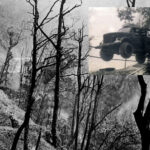The Astonishing Tale
A recent viral online sensation featured British stuntman Jim Dowdall, renowned for his appearances in blockbuster films like James Bond, the Bourne series, and Indiana Jones. He accomplished a jaw-dropping feat of driving a Jaguar XF sports car across the Thames river using only two 1-inch diameter cables.
However, the bewilderment would have been lessened had people known that the Truong Son army drivers had been performing similar stunts for a long time. What’s even more astounding is their ability to drive trucks across these cables, not just small cars, utilizing various support devices like Dowdall did.

In early 1965, Lieutenant General Dinh Duc Thien, then Chief of the General Department of Logistics, was sent to China on an official visit. There, he was captivated by the cable bridges that spanned from one mountain to another, from one river bank to another, dating back to the anti-Japanese resistance period.
Upon returning to Vietnam, General Dinh Duc Thien presented the structures he observed in China to the Institute of Transport Engineering. In collaboration with several departments from four universities in Hanoi, extensive research was carried out, leading to the adoption of this “new” transportation method on the battlefields of the Truong Son road.
At that time, Nguyen Trong Quyen, a teacher in the motorcycle department at the Logistics Officer School, was selected as the first driver to attempt driving on the cable. He recounted, “For the initial test, my colleagues and I drove on the cable in the Dien Bridge area, spanning the Nhu? river.
The engineers constructed concrete pylons approximately 5-6 meters underground using an electromagnetic punching machine. A thick cable, similar to a wrist, was then passed from one side of the river to the other using a winch, adhering to the engineers’ precise calculations. I drove a Soviet truck that operated on a pulley system attached to the cable, resembling a train rides on its rails.”
Initially, I assumed the pulleys would smoothly glide along with the cable, but instead, they swung violently. From February 1965 to May 1965, I conducted extensive testing in two ways. Firstly, driving using the pulleys as previously described, and secondly, designing a sliding floor for trucks with a load capacity of 4 tons or more.
With the pulley system, a 1-ton truck driving on the cable would hardly be detected from the air, as reconnaissance planes would only see two lines without suspecting they were bridges. For trucks weighing 4 tons or more, we employed a sliding surface in densely forested areas, making it harder for enemy reconnaissance planes to spot us.”
The Daring Experiment
In June 1965, Deputy Prime Minister and Minister of Transport at the time, Phan Trong Tue, invited members of the Government Council and all ministers to witness the final trial in preparation for implementing this method on the battlefields of the Truong Son road.
The Institute of Transport Engineering selected Canh Dien, located approximately 1 km from Dien Bridge over the Nhu? river as the site for the crucial trial.
Quyen recalls, “Around 8 o’clock in the morning, the Deputy Prime Minister requested that I drive for everyone to observe. Mr. Dang Van Thong, the director of the Institute of Transport, pointed to the cable’s oscillation meter and said: ‘While driving, if the car tilts to the left or right less than 15 degrees, just continue driving.
If the car tilts from 16 to 17 degrees, you and the passenger must jump into the river so that the construction workers below can rescue you.” I drove approximately 1/4 of the cable length and noticed the gauge jump to 10 degrees. At about 1/3 of the cable, it reached 15 degrees. Just then, looking into the rearview mirror, my passenger, Nguyen Van Xay, urgently exclaimed, ‘Sir! People on the shore are waving flags and signaling for our guys to jump.”
Jokingly, I responded, ‘Our comrades would be thrown into the jaws of death. If they jump, they will be crushed and drowned under the river. We’ll just go wherever the current takes us. So be it.”
Just moments after my comment, the car flipped and plunged into the river, with 3 tons of concrete spilled out. The car lost traction and somersaulted three times. Fortunately, due to the tightly closed doors, water seeped in slowly rather than rushing in.
Both Xay and I sat and observed impending doom inching closer inside the cabin. A glimmer of hope flickered momentarily, and I whispered to Xay, ‘Now, you and I need to lie down and wait for the pressure inside the cabin to equalize with the water pressure outside. Then, we’ll kick open the door and jump out…’”
The Ingenious Bridges…
Following that unfortunate incident, the efforts seemed futile for Quyen’s driving journey. However, they focused on determining the cause and discovered that the flipped car resulted not from his driving skills but because the concrete pylon had sunk and tilted after a rainstorm during the night. This caused the truck to slide and become incapable of bearing the load, swaying in the wind. As it shook more vigorously, the bridge pylon became dirtier, tangling the cable and accelerating the car’s descent.

The subsequent trial was meticulously calculated, with concrete pylons securely fastened with steel, and measuring the cable tension within the permissible range instead of randomly setting the pylon, as was done in the earlier experiment. With government officials watching closely, this definitive test on November 11, 1965, was a resounding success.
The government then decided to install cable bridges for pulley-driven vehicles at Km 0 (Dac Krong, Quang Tri) for the first time. Subsequently, a series of exceptional bridges were replicated throughout the Truong Son road, facilitating the transportation of equipment and military supplies from the northern rear to the southern battlefields. This significantly contributed to the historic victory in the spring of 1975 and the subsequent national reunification…
- Zil 157 – The “Hero” Vehicle on Truong Son Road
- Admire the “super cool” fleet of the Vietnamese military
- The only female driving unit on the Truong Son Road
Anh Duc compiled (TTTD)
Source: TT&VH









































